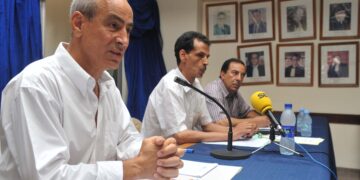Closure of Teachers' Syndicate Since 2020, Prosecutions of Syndicate Board, Forced Retirement of Activist Teachers, Are Retaliation for Challenges to Government
(Washington D.C., November 21, 2022): Jordan's Minister of Education immediately should comply with the June 26, 2022 final Court decision to reopen the shuttered Teacher's Syndicate, the country's only union organized to protect the rights of the country's teachers, said Democracy for the Arab World Now (DAWN).
The government should also end its retaliatory actions, including arrests of protesting teachers, malicious prosecutions of syndicate board members and forced retirements of teachers who had demanded reforms.
"The Jordanian government's stubborn refusal to comply with the orders of its own judiciary shows a troubling disrespect for the country's citizens, exempting itself from the laws it expects them to abide by" said DAWN's Senior Consultant Jamal Al Tahat. "The persistent retaliation against members of the teacher's union, including arrests, lawsuits and suspension of their union, is a vicious display of the government's weaponization of its authority to quash the rights of the Jordanian people."
Following the syndicate's appeal of its closure and dissolution of its board by the state prosecutor, the Court issued its final decision of June 26, 2022, overturning the Prosecutor's decision to suspend the syndicate and effectively requiring elections for a new syndicate board. Article 27 of the Syndicate Law requires the Minister of Education to set up an interim committee to run the Teachers' Syndicate in the event it is dissolved and to elect a new board within six months. The government's continued closure of the Syndicate also violates international human rights laws protecting freedom of association.
In response to demands from the Syndicate to comply with the court order, former Education Minister Dr. Wajih Owais claimed that the Ministry had not officially received the court's decision. On July 25 and August 9, Syndicate lawyer Basam Fraihat formally wrote to Owais demanding that he reopen the Syndicate as per the court's decision. A member of parliament told DAWN on October 11, 2022, on the condition of anonymity, that when he asked then Minister Owais in early September why he hadn't complied with the court order, the minister told him that the decision wasn't his to make: "It is not my decision; it is from above," he reportedly said, presumably alluding to the king, who is the only one with authority over cabinet ministers.
The government has also moved to retaliate against activist teachers who have demanded improved wages and work conditions. This includes arrests of teachers protesting for improved work conditions, frivolous lawsuits brought by the Jordanian prosecutor against Syndicate board members, and, most recently, forcing activist teachers into early retirement. According to persons involved with the Syndicate whom DAWN interviewed, the retaliatory actions also appear linked to the efforts of the Teachers' Syndicate Academy to provide free teacher training and certification, funded by USAID, that put it in competition with the royal-backed Queen Rania Training Academy.
"The Jordanian prosecutor's numerous lawsuits against the Syndicate board, including arrests of board members, is a shocking abuse of the country's judiciary to punish citizens because they have dared to demand basic labor reforms," said a veteran member of the Parliament who asked not be named, "Every single action the government has taken against the Syndicate smacks not only of retaliation for teacher activism, but an effort to quash free teacher training in competition with a royal teacher's academy".
DAWN urged the United States, as Jordan's primary provider of military and economic assistance, a total of $1.735 billion in 2022, to end its assistance to the government in light of persistent abuses of human rights, including the closure of the country's only Teachers' Syndicate, as well as extensive evidence of corruption by the royal family.
DAWN also called on the international community to consider ending support for any organization in Jordan led by members of the royal family, in light of disturbing evidence that suggests that the government has prosecuted civil society organizations that threaten their monopoly on international funding.
BACKGROUND
The Teachers Syndicate was reestablished in 2011 pursuant to Teachers' Syndicate Law Number 14, for 2011, as a union for the country's approximately 120,000 teachers. In March 2019, the syndicate elected its fourth board and Dr. Ahmad Al Hajaya as president, and mandated them to focus on increased salaries and improved professional conditions. The board urged these reforms in letters to the government, parliament and the Royal Court from May to July 2019, but received no reply. Since then, the government and the syndicate have been locked in battle over the government's failure to address the teacher's demands, leading to protests and strikes.
In July 2019, the board of the Teachers' Syndicate announced they would go on strike on September 5, 2019, the beginning of the school year. Shortly thereafter, Maj. Gen. Ahmad Husnie Hatoqai, the director of Jordan's intelligence department, summoned the Board president Al Hajaya, to his office and threatened him with unspecified "severe consequences" over the plan to go on strike, according to Kefah Abu Farhan, a Syndicate board member who heard Al Hajaya describe the encounter, and spoke to DAWN on October 26, 2022.
Initially, the government appeared to reach an agreement with the Syndicate to increase teacher salaries and allow the syndicate to offer free teacher training and certification, but the agreement fell apart in the wake of the accidental death of Board president Al Hajaya. As a result, the teachers syndicate carried out a protest on September 5, 2019 with approximately five thousand protesters, despite police measures to prevent teachers from reaching the protest site. Then Prime Minister Al Razzaz issued a public apology to the teachers about the undignified treatment of teachers by police, which included beating teachers in the streets and arresting them in humiliating measures.
The teacher's strike commenced on September 8, 2019 with overwhelming participation from Jordanian teachers in public and private schools, according to Basel Al Hroub, a syndicate board member. Sixty-five percent of the Jordanian public supported the strike as well, according to an opinion survey by the Strategic Research Center in the University of Jordan.
On October 5, 2019, after a month when schools remained closed, the government finally relented and signed an agreement with the Syndicate, and the teachers ended their strike. The government agreed to a "gradual" salary increase of 40% to 75% , effective January 1, 2020. The monthly salary of public school teachers is between $500 and $1000, while some private schools teachers earn as little as $150, far less than the legal minimum wage.
Competition with Queen Rania Academy Over US AID Funds
The Education Ministry also said it would officially recognize the Syndicate's Training Academy, established on October 29, 2017, authorizing it to provide free training for teachers to improve their performance. This would allow the academy to compete directly with the Queen Rania Teachers Academy, established in 2009, which had commenced fee-based, private training and certification of teachers. The government allowed the Syndicate's Academy to start its activities by October 26, 2019. However, the King fired Education Minister Walid Al Maani two weeks after his initial recognition of the Syndicate's Academy.
The competition between the two academies appears to have centered in particular over USAID funding for teachers' training programs. USAID started funding the Queen Rania Academy in 2019, but after the official recognition of the Syndicate Academy, USAID withdrew its grant to the Queen Rania Academy in 2021, channeled the money instead to education faculties in various public universities, and commenced plans to cooperate with the Syndicate Academy.
Harassment Litigation Against the Syndicate, Closure of Syndicate and Dissolution of Board, Arrest of Board Members
In April 2020, the Government announced it would not increase teacher salaries pursuant to the 2019 agreement. The syndicate protested the decision and pressured the government to fulfill its promises under the agreement. The government appears to have retaliated against the Syndicate commencing several prosecutions against the Syndicate's board with the goal of securing its permanent closure. Prosecutor Ahmad Al Faouri brought the first case against the board members on May 20, 2020, reactivating an earlier case accusing the Syndicate and its first two Boards of wasting public money, citing the Syndicate Health Fund's losses of JD 12,405 ($17,367) between 2012 and 2020. A court decision in this case is due on November 28, 2022.
On June 4, 2020 prosecutor Al Faouri filed a second case against the Syndicate based on a complaint by two dozen teachers, again accusing them of wasting public money for contributing JD 500,000 ($700,000) to a national fund established by a royal decree to fight COVID-19.The Supreme Court overturned the Appeals Court decision in favor of the prosecution, and sent the file back to the Primary Court on March 20, 2022.
Five days after the Syndicate's meeting to secure USAID funding, prosecutor Hassan Al Sirhan on July 20 2020 commenced an investigation of the Syndicate and sought its dissolution, citing a post published by the Board on the Syndicate's Facebook page; the post called for new protests against the government's failure to implement the promised salary raises. The prosecutor charged the Syndicate and the Board with interfering in elections, pursuant to Article 57 of the Election Law and Article 15 of the Cyber Crime Law; illegal gathering, pursuant to Articles 164, and 80/1, of the Penal Code; encouraging others to publicize and write to carry out illegal acts, as per Article 161 of the Penal Code and Article 15 of the Cyber Crime Law; and inciting hatred as provided in Article 467 of Penal Code.
On July 23, 2020, also less than 10 days after the USAID meeting, prosecutor Al Faori wrote to the Education Ministry requesting it to suspend the Syndicate from operation and freeze its board for two years. On July 25, 2020, the police closed the syndicate headquarters and all of its branch offices, including its training academy, and arrested its 13 board members, releasing them after one month.
The prosecutor's closure of the Syndicate and arrest of its leaders ended efforts to resume negotiations between the Syndicate Board and then the Minister of Education Dr. Tayseer Al No'aimi, and blocked any possibility for a political solution. The prosecutor also issued a gag order against the Syndicate board, banning them from discussing the issue, silencing a civic body serving Jordanian teachers.
The Primary Court in its capacity as an Appeals Court approved the dissolution of the Board on June 26, 2022, but maintained the operation of the Syndicate. The court decision was severely delayed, arriving only 27 days before the expiration of the prosecutor's two-year suspension of the Syndicate, and three months after the board's term had ended.
Forced Retirement of Activist Teachers
In a video of a meeting of Parliament's Education Committee on Wednesday October 27, 2021 widely distributed in Jordan and reviewed by DAWN, the Secretary General of the Ministry of Education Dr. Nawwaf Al Ajarmeh, defended the forced early retirement of activist teachers, including members of the Syndicate Board, accusing them of "deviating from the path of public activities", and stated in contradiction of Jordanian law and human rights law that "striking is forbidden in all constitutions, in the Civil Service By Law, and in the Teachers Syndicate Law." In fact, this is totally not true. No one can consciously say that striking is forbidden in "all constitutions", while most constitutions enshrine the political rights of including protest and striking.
In a positive development, the ongoing closure of the Teachers Syndicate and the persecution and harassment of activist teachers has paved the way for the development of new civil society organizations. On October 12, 2022, a group of teachers announced that they had organized a volunteer committee to defend teachers who have been targeted by the government.
The United States is Jordan's primary provider of military and economic assistance, granting a total of $1.735 billion in 2022. A new Memorandum of Understanding with Jordan commits the United States to provide $1.45 billion per year to Jordan from FY 2023 to FY 2029. DAWN urged the United States to end this assistance to the country in light of Jordan's widespread and systematic abuses of human rights, including the closure of the country's only Teachers' Syndicate detailed here, as well as extensive evidence of corruption by the royal family.
DAWN also called on the international community to consider ending support for any organization in Jordan led by members of the royal family, in light of disturbing evidence that the government has prosecuted civil society organizations that threaten their monopoly on international funding.







































